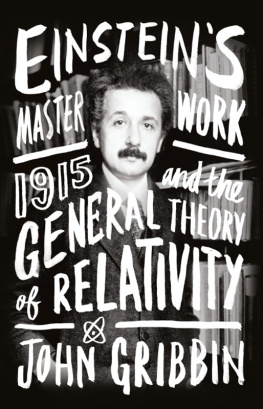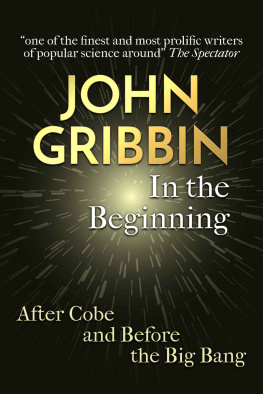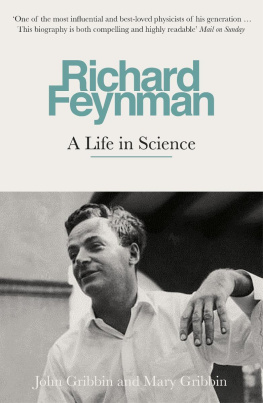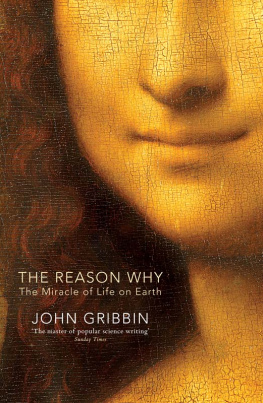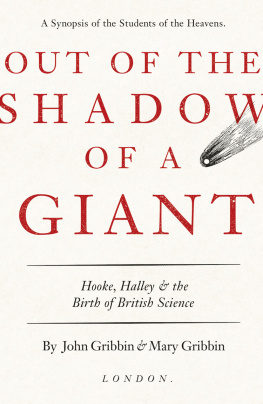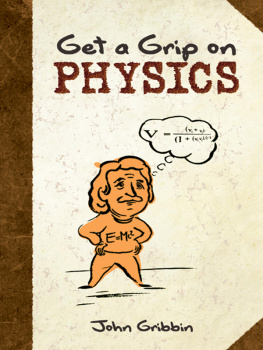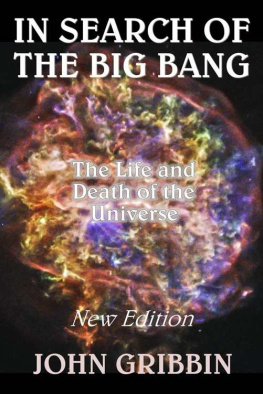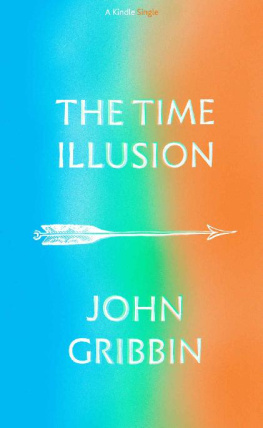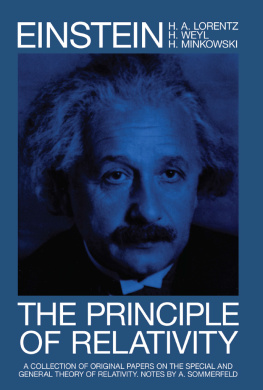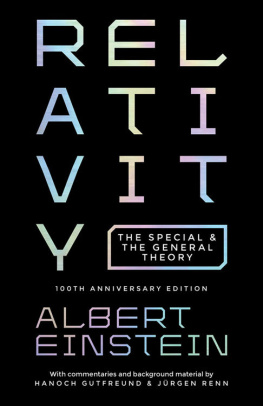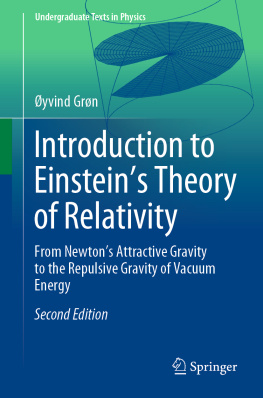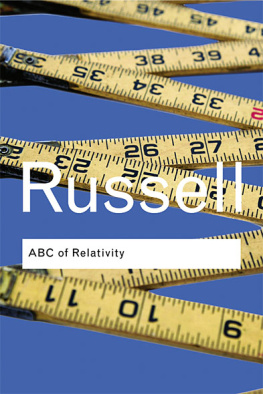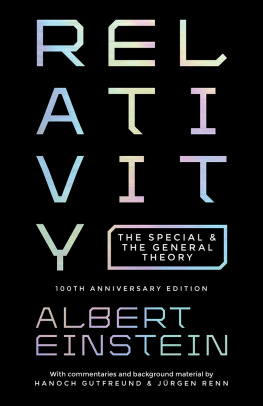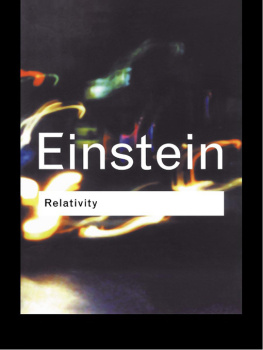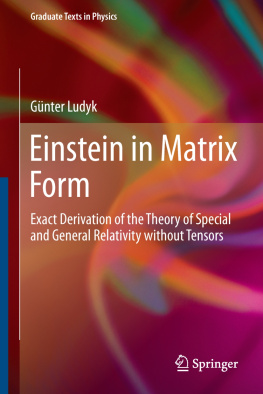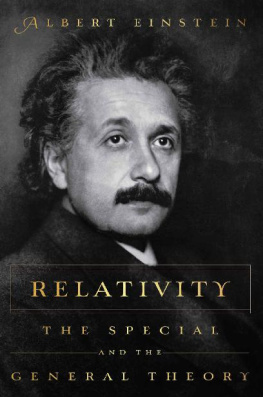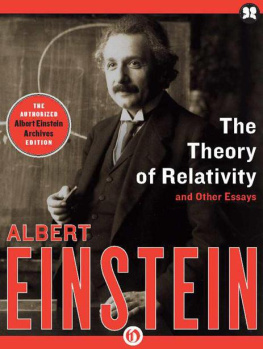John Gribbin - Einstein’s Masterwork - 1915 and the General Theory of Relativity
Here you can read online John Gribbin - Einstein’s Masterwork - 1915 and the General Theory of Relativity full text of the book (entire story) in english for free. Download pdf and epub, get meaning, cover and reviews about this ebook. year: 2016, publisher: Icon Books Ltd, genre: Science. Description of the work, (preface) as well as reviews are available. Best literature library LitArk.com created for fans of good reading and offers a wide selection of genres:
Romance novel
Science fiction
Adventure
Detective
Science
History
Home and family
Prose
Art
Politics
Computer
Non-fiction
Religion
Business
Children
Humor
Choose a favorite category and find really read worthwhile books. Enjoy immersion in the world of imagination, feel the emotions of the characters or learn something new for yourself, make an fascinating discovery.
- Book:Einstein’s Masterwork - 1915 and the General Theory of Relativity
- Author:
- Publisher:Icon Books Ltd
- Genre:
- Year:2016
- Rating:3 / 5
- Favourites:Add to favourites
- Your mark:
- 60
- 1
- 2
- 3
- 4
- 5
Einstein’s Masterwork - 1915 and the General Theory of Relativity: summary, description and annotation
We offer to read an annotation, description, summary or preface (depends on what the author of the book "Einstein’s Masterwork - 1915 and the General Theory of Relativity" wrote himself). If you haven't found the necessary information about the book — write in the comments, we will try to find it.
Einstein’s Masterwork - 1915 and the General Theory of Relativity — read online for free the complete book (whole text) full work
Below is the text of the book, divided by pages. System saving the place of the last page read, allows you to conveniently read the book "Einstein’s Masterwork - 1915 and the General Theory of Relativity" online for free, without having to search again every time where you left off. Put a bookmark, and you can go to the page where you finished reading at any time.
Font size:
Interval:
Bookmark:
Einsteins Masterwork
Einsteins Masterwork
1915 and the General Theory of Relativity
JOHN GRIBBIN
with MARY GRIBBIN

Published in the UK in 2015 by
Icon Books Ltd, Omnibus Business Centre,
3941 North Road, London N7 9DP
email:
www.iconbooks.com
Sold in the UK, Europe and Asia
by Faber & Faber Ltd, Bloomsbury House,
7477 Great Russell Street,
London WC1B 3DA or their agents
Distributed in the UK, Europe and Asia
by TBS Ltd, TBS Distribution Centre, Colchester Road,
Frating Green, Colchester CO7 7DW
Distributed in Australia and New Zealand
by Allen & Unwin Pty Ltd,
PO Box 8500, 83 Alexander Street,
Crows Nest, NSW 2065
Distributed in South Africa by
Jonathan Ball, Office B4, The District,
41 Sir Lowry Road, Woodstock 7925
ISBN: 978-184831-852-6
Text copyright 2015 John and Mary Gribbin
The authors have asserted their moral rights
No part of this book may be reproduced in any form, or by any means, without prior permission in writing from the publisher
Typeset in Dante by Marie Doherty
Printed and bound in the UK by Clays Ltd, St Ives plc
List of Illustrations
The most valuable theory of my life
The theory is of incomparable beauty.
ALBERT EINSTEIN, 1915
If Einstein had not produced the Special Theory in 1905, someone else would have done so within a short time, five years or so. That is the general situation with almost all scientific advances, they are in the air; if A doesnt make them, then B certainly will.
The General Theory is the startling exception, maybe the only one in [the 20th] century. It is agreed by the most eminent of theoretical physicists Dirac has said so without qualification that if Einstein had not created the General Theory [in 1915] no one else would have done so, perhaps not until now, perhaps not for generations.
C.P. SNOW, IN CONVERSATIONS WITH EINSTEIN
BY ALEXANDER MOSZKOWSKI
About the Author
John Gribbin was born in 1946 in Maidstone, Kent. He studied physics at the University of Sussex and went on to complete an MSc in astronomy at the same university before moving to the Institute of Astronomy in Cambridge, to work for his PhD.
After working for the journals Nature and New Scientist, he has concentrated chiefly on writing books on everything from the Universe and the Multiverse to the history of science. His books have received science-writing awards in the UK and the US. His other biographical subjects include Erwin Schrdinger, Stephen Hawking, Richard Feynman, Galileo, Buddy Holly and James Lovelock.
Since 1993, Gribbin has been a Visiting Fellow in Astronomy at the University of Sussex.
Introduction
In 1905, Albert Einstein published four scientific papers that had a profound influence on the science of the 20th century. Everybody knows Einsteins name, and an equation from one of those papers, E = mc2, is the most famous equation in all of science. For another of his contributions that year, he received the Nobel Prize. All of this has resulted in 1905 being referred to as Einsteins annus mirabilis, or miraculous year. If he had never done another stroke of scientific work after 1905, Einstein would still be remembered as a genius. But, amazing as these achievements were, none of this represented Einsteins greatest work. Exactly ten years later, in 1915, he presented his masterwork to the Prussian Academy of Sciences a theory of gravity, matter, space and time which we know as the General Theory of Relativity, and which he described as the most valuable theory of my life. It describes the evolution of the Universe, black holes, the behaviour of orbiting neutron stars, gravitational lensing and why clocks run slower on the surface of the Earth than in space. It even suggests the possibility of time travel. He completed this work in Berlin during the First World War, where he later suffered from malnutrition caused by food shortages resulting from the Allied blockade of Germany and was nursed by his cousin, Elsa, who became his second wife. The accuracy of his theory was confirmed by British astronomers, at a time when Britain and Germany were technically still at war. But even today the General Theory is less feted than the achievements of 1905, because it is regarded as too difficult for ordinary mortals to comprehend. I hope to disabuse you of this misapprehension and make it clear why the achievements of the year 1915 should be at least as celebrated as those of 1905.
The Special Theory of Relativity, one of the achievements of 1905, is special in the sense that it is restricted and only describes the behaviour of things moving in straight lines at constant speed. The names alone tell you that the General Theory is a bigger deal, but because of the widespread (mis)conception that the General Theory is too difficult for ordinary mortals to understand, the events of 1915 have been less feted than the events of 1905.his life and work both before and after 1915, including his breakthrough year of 1905.
As ever, I am grateful to the University of Sussex and the Alfred C. Munger Foundation for providing, respectively, a base for me and a contribution towards my travel and other expenses. Thanks also to Estelle Asmodelle for help tracking down sources.
John Gribbin
https://johngribbinscience.wordpress.com
Footnote
A point of pedantry: always the General Theory, never general relativity; it is the theory that is general, not the relativity.
In the Beginning
Early life; Breaking free; Einstein and the Poly; Rejection; Rescue
In 1905, Albert Einstein produced the most important package of ideas from any scientist since Isaac Newton. The iconic image we have of Einstein is the white-haired genius, a wise and fatherly guru, a cross between God and Harpo Marx. But in 1905 Einstein was a handsome, dark-haired young man (he celebrated his 26th birthday on 14 March that year), previously something of a ladies man but recently married, with a baby son. He didnt even have a PhD at the time he published the scientific papers that made him famous.
What made Newton and Einstein so special was that they didnt just have one brilliant idea (like, say, Charles Darwin with his theory of natural selection) but a whole variety of brilliant ideas, within a few months of one another. There were other similarities between the two great men. In 1666, Newton celebrated his 24th birthday, and although he had already obtained his degree from the University of Cambridge, for much of 1665 and 1666 he had been unable to take up a Fellowship at Trinity College because the university had been closed by an outbreak of plague. So he had been working in isolation at the family home in Lincolnshire. In 1905, the 26-year-old Einstein had already graduated from the Swiss Federal Polytechnic in Zurich, but had been unable to obtain a post at any university. So he had settled for a junior post at the patent office in Bern, working in isolation on scientific topics at home in his spare time and also, as he later admitted, during office hours.
Especially in the theoretical sciences and mathematics, it is often true that people do their best work in their twenties, even if that work never matches the achievements of a Newton or an Einstein. But there the similarities between the two geniuses stop. Newton was a loner by choice, who made few friends and never married; although most of his great work was done in 16656, it was only published later, at different times, in response to pressure from colleagues who became aware of what he had achieved. Einstein was a gregarious family man, eager to get a foothold in the academic world, who knew the importance of advertising his discoveries and published them as soon as he could. It was his only chance of getting out of the patent office and into a university post. But what was the man later regarded as the greatest genius of the 20th century doing working in a patent office anyway?
Next pageFont size:
Interval:
Bookmark:
Similar books «Einstein’s Masterwork - 1915 and the General Theory of Relativity»
Look at similar books to Einstein’s Masterwork - 1915 and the General Theory of Relativity. We have selected literature similar in name and meaning in the hope of providing readers with more options to find new, interesting, not yet read works.
Discussion, reviews of the book Einstein’s Masterwork - 1915 and the General Theory of Relativity and just readers' own opinions. Leave your comments, write what you think about the work, its meaning or the main characters. Specify what exactly you liked and what you didn't like, and why you think so.

